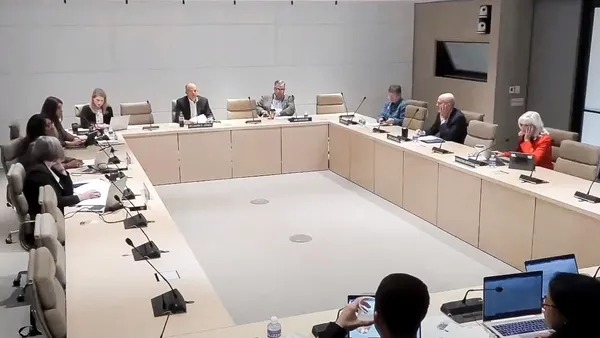Dive Brief:
-
COVID-19 has forced CFOs to become "change agents" and "strategists" while still overseeing their day-to-day finance responsibilities, Grant Thornton's 2020 CFO Survey Report found.
-
"Transitioning to the lockdown was a massive undertaking, requiring CFOs to use their skills in new ways," Nick Vellani, Grant Thornton financial management principal, said. "Whether CFOs will permanently own their new 'change agent' and 'strategist' roles after the pandemic subsides will largely depend on their abilities to delegate, automate, train and outsource."
-
The report is based on two data sets: one from February and another from May. In the latter survey, 42% of CFOs reported spending as much as half their time in a "strategist" role, a 13-point jump from February
Dive Insight:
The number of CFOs spending more than half their time on core CFO responsibilities, including control and compliance efforts, dropped from 36% in February to 8% in May. Only 9% of CFOs said they spent more than half their time handling transactional processes in May: down from February's 40%.
Nonetheless, Vellani sees traditional CFO responsibilities as even more important nowadays, especially with regards to recent stimulus packages.
"Those things are fraught with fraud currently," Vellani said. "As companies participate in these programs, it's important CFOs have a finger on the pulse. They have more leverage within the organization, and can step into the reviewer role rather than the producer role."
The pandemic has had a large impact on innovation within organizations; in the February survey, seven in 10 finance leaders said they had implemented key emerging technologies or planned to do so within two years. By May, 62% of respondents had delayed their innovation projects, 19% reshaped such projects, and only 19% accelerated innovation projects.
"To maintain positive momentum, decision makers must continue pushing for innovation, even during the economic slowdown," Chris Stephenson, managing principal of product innovation at Grant Thornton said. "While it's often [at] the core, boundaries of innovation extend beyond just technology."
Finance leaders should identify their immediate challenges and develop incremental improvements that deliver measurable results, Stephenson said.
"Unlike transformative technological upgrades, incremental enhancements often require little or no financial investment," he added. "By thinking incrementally, CFOs can make continual innovations tailored to immediate challenges, which delivers ongoing results, especially during a pandemic."
In February, innovation was top of mind for CFOs. But upon the May survey, innovation came to "almost a screeching halt," Vellani said, which shouldn't be the case.
"During a pandemic, a time of significant change in how business works, is when you should be innovating," he said.
Among the study's most important findings: CFOs consider data analytics and analysis to be less important now than pre-pandemic.
"It's almost counter-intuitive to want better data in a changing business environment instead of a quickly growing environment," Vellani said. '"That tells me CFOs see data analytics as a nice-to-have instead of a must-have. But for the CFO to continue playing that strategist role, data analytics are really what'll keep them in the driver’s seat."
Vellani's bottom line to CFOs: leverage your team effectively, make sure you’ve got the right people in the right roles, and don't stop innovating just because times are trying.
"Innovation is extremely important in situations like this, where you need to keep performing business functions," he said. "Innovation doesn't have to mean big tech. It can be listening to your employees and team, and carrying the business forward by doing more with less."













